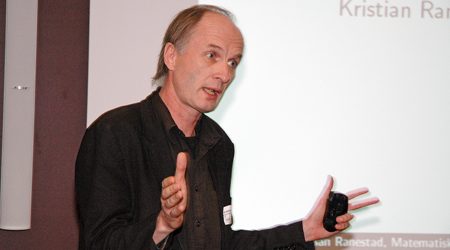Tidligere arrangementer - Side 98
Hyperbolic-Elliptic models for two-phase flow in porous media
Geir Ellingsrud, UiO, gives the Seminar in Algebra and Algebraic Geometry:
Projective models of K3-surfaces (after Saint-Donat)
Bas Jordans will continue his talk from last week.
Potential flow with free boundaries using the level set method. A review of some electro-hydrodynamic applications
Friday seminar by John M. Fryxell, University of Guelph, Canada
Karen Johansen, Senior Adviser, Office for International Relations and Research Support
&
Oddbjorn Engvold, Professor emeritus, ITA
John Christian Ottem, UiO, gives the Seminar in Algebra and Algebraic Geometry:
Introduksjon til K3-flater (etter Saint-Donat)
Bas Jordans will give a talk with title " Random walks on discrete quantum groups: convergence to the boundary"
Abstract:
For classical random walks there exist two boundaries: the Poisson boundary and the Martin boundary. The relation between these two boundaries is described by the so-called "convergence to the boundary". For random walks on discrete quantum groups both the Poisson boundary and Martin boundary are defined and a non-commutative analogue of convergence to the boundary can be formulated. However, no proof is known for a such a theorem. In the first part of the talk we will discuss the classical and quantum version of convergence to the boundary, explain how these are related and give an overview of what is known in general for the quantum case. In the second part we will discuss the boundary convergence for SUq(2) and for monoidally equivalent quantum groups.
Friday seminar by Indr? ?liobait?
J?rgen Vold Rennemo (Oxford), gives the Seminar in Algebra and Algebraic Geometry:
Gauge-dualitet
Francisco José Bullejos Carrillo (post doc, AQUA)
Key Words: Saharan aerosol nutrient inputs; UVR; phyto-zooplankton coupling
The School of Pharmacy and Centre for Integrative Microbial Evolution (CIME) invites you to the CIME International Winter Symposium held in conjunction with an honorary symposium for professor Anne-Brit Kolst? who retired from her position at the School of Pharmacy July 31st 2015. Please register for lunch by email to: aloechen@farmasi.uio.no
Signe Riemer-S?rensen, Post-Doctoral researcher, ITA
By Sigrun Jonasdottir
Raoul Wolf, PhD student AQUA, IBV
Lars A. Buchhave, Postdoc, Centre for Star and Planet Formation, University of Copenhagen.
Kristian Ranestad, UiO, gives the Seminar in Algebra and Algebraic Geometry:
Variety of sums of powers of bihomogeneous forms
Peter Lumsdaine, Stockholms Universitet, vil gi to seminarinnlegg, det ene p? logikkseminaret.
Piotr Soltan (University of Warsaw) will give a talk with title: Subgroups of quantum groups, the center and inner automorphisms
Tobias Erhardt (Technische Universit?t, München) will give a seminar in the lunch area, 8th floor N.H. Abel's House at 14:15 November 24th.
Arnaud Brothier, Vanderbilt University (USA) will give a talk with title: Analytic properties for subfactors
Abstract:
I will discuss analytic properties for groups and their generalizations to subfactors, standard invariants, and certain tensor categories.
I will present a class of subfactor planar algebras that are constructed with a group acting on a bipartite graph.
I will show that if the group satisfies a given approximation property (such as amenability, Haagerup property, or weak amenability), then the subfactor planar algebra satisfies it as well.
I will exhibit an infinite family of subfactor planar algebras with non-integer index that are non-amenable, have the Haagerup property, and have the complete metric approximation property.
Paul Krühner (TU Wien) gives a lecture with the title: Time change equations for Lévy type processes
CEES Extra seminar by Laura Nu?o de la Rosa
Rough paths and rough partial differential equations




